












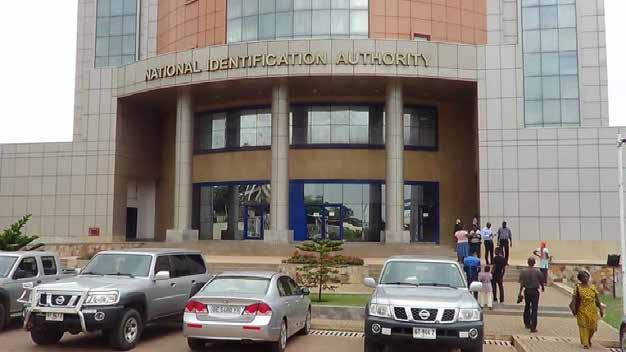 By Eugene Davis
By Eugene Davis
The National Identi cation Authority (NIA) has registered a total number of 163,213 foreign ers made up of persons of various nationalities, the Minis ter of Interior, Ambrose Dery, has told parliament.
He also explained that 1,958 Ghanaians who have become citizens of other countries and renounced their Ghanaian citizenship -Germany and Neth erlands have also been regis tered as foreign nationals.
Appearing before parliament last Thursday to answer a ques tion on the nationality break down of foreigners who have
registered with NIA, he said “As at 20th October 2022, NIA has registered a total number of 163,213 foreigners made up of persons of various nationalities. 1,958 Ghanaians who have become citizens of other coun tries and renounced their Ghana ian citizenship -Germany and Netherlands have also been regis tered as foreign nationals.”


The National Identi cation Authority’s (NIA) mandate to create, maintain provide and promote the use of the national identity cards commonly known as “Ghana Card” for the advance ment of the country’s economic ,political and social activities as
stipulated in National Identi ca tion Authority Act,2006 (Act 707) is ongoing.
The NIA is currently running two Public Private Partnership (PPP) Projects namely the Foreigner Identi cation Management Systems Project (FIMS) for the registration of Foreigners in Ghana, which commenced in 2012 and the National Identi cation System (NIS)Project which started in 2018 for the registration of Gha naians from age zero to in nity.
The authority in an earlier announcement also indicated it has so far issued 15,826,148 Ghana cards out of the 16,627,325 printed cards from 17,109,627 registrations as of the end of August this year.
The Ghana Card is the primary and sole identity card for SIM re-regis tration and for other o cial requirements in state and some private institutions.
Already, government has disclosed children born from the end rst quarter of 2023 in Ghana will be issued with Ghana Cards. There are plans underway to inte grate the databases of Ghana Health Service, National Health Insurance Authority, National Identi cation Authority and Ghana Statistical Service.
This week, PS talks with Nouriel Roubini, Professor Emeritus of Economics at New York Univer sity’s Stern School of Business, Chief Economist at Atlas Capital Team, CEO of Roubini Macro Associates, Co-Founder of TheBoomBust.com, and the author of MegaThreats: Ten Dangerous Trends That Imperil Our Future, and How to Survive Them.

Nouriel Roubini: Central banks are in both a stag ation trap and a debt trap. Amid negative aggregate supply shocks that reduce growth and increase in ation, they are damned if they do and damned if they don’t. If they increase interest rates enough to bring in ation down to 2%, they will cause a
severe economic hard landing. And if they don’t – attempting instead to protect growth and jobs – they will be left increasingly far behind the curve, leading to a de-anchoring of in ation expecta tions and a wage-price spiral. Very high debt ratios (both private and public) complicate the dilem ma further. Raising interest rates enough to crush in ation causes not only an economic crash, but also a nancial crash, with highly leveraged private and public debt ors facing severe distress. The resulting nancial turmoil that intensi es the recession, creating a vicious cycle of deepening reces sion and escalating nancial pain and debt distress.
In these circumstances, central banks will blink. They will wimp
out in the ght against in ation, in an e ort to avoid an economic and nancial crash. But that will lead to a higher permanent in a tion rate, while only postponing the arrival of stag ation and debt crises. In other words, central banks in the United States, Europe, and other advanced
Continued from page 2
economies have only bad options.
PS: As you put it in your new book, MegaThreats: Ten Danger ous Trends That Imperil Our Future and How to Survive Them, we are headed toward the “Mother of All Debt Crises,” and none of the potential solu tions is without costs. We must “choose our poison.” But does more noxious mean more e ec tive? For developing economies, in particular, are innovative proposals like debt-for-climate swaps examples of policies that recognize the interconnected nature of today’s megathreats?
NR: Solutions for debt distress are never easy or costless. There are always trade-o s. Monetiz ing the debt and wiping out its real value with unexpected in a tion works only for countries that borrow in their own curren cies, and relying on the in ation tax to wipe out debts causes a persistent increase in the in a tion rate. For debt denominated in a foreign currency, the only feasible option is a default and restructuring when the debt has become unsustainable – process es that can be messy and protracted, and that can cost a country access to capital mar kets. Imposing taxes on wealth or capital to reduce unsustain able debt levels is not only politi cally di cult; it can also under mine investment, capital accu mulation, and growth.
Debt-for-equity or debt-for-cli mate swaps convert the debt claims of creditors into equity claims or claims to reduce greenhouse-gas emissions. But they are not large enough in scope to resolve severe debt problems, and debtors may feel that converting debt into equity on emissions-reduction claims erodes sovereignty by e ectively transferring the ownership of a country’s natural resources and assets to foreign entities. Debt-for-climate swaps can neither resolve debt distress nor contribute much to combating climate change.
PS: One example of the “slow-motion negative supply shocks” that will characterize the “Great Stag ation” is “ scal policies to boost wages and workers’ power.” One of the ten “megathreats” you highlight in your book is the rise in income and wealth inequality, which is fueling a backlash against democracy. What policies or interventions would help count er the distributional e ects of the current crisis, without inad vertently exacerbating it?
NR: Income and wealth inequali ty have been rising within coun-
tries for many reasons. Notable factors include trade and global ization, technological innovation (which is capital-intensive, skill-biased, and labor-saving), the self-reinforcing political power of economic and nancial elites, the concentration of oligopolistic power in the corpo rate sector, and the declining power of labor and unions. Together, these factors have triggered a backlash against liber al democracy.
Fiscal policies that support work ers, unions, the under- and unemployed, and disadvantaged groups (such as women and racial minorities) can help to reduce inequality, but they also lead to higher in ation by increasing wage in ation. And given corporations’ dispropor tionate pricing power (compared to labor), prices rise more than wages, as has occurred in 2021 and 2022. The result is a decline in real wages, which exacerbates inequality.
Historically, scal policies –including progressive taxation –have had only a modest impact on inequality. And the rise of arti cial intelligence, robotics, and automation mean that labor is set to become even weaker over time, as humans lose many jobs – routine, cognitive, and increasingly even creative jobs –to software and robots.
PS: You indicate in MegaThreats that whoever leads in AI may become the leading global power, and you suggest that China may get there rst. But the recent government crackdown on tech companies has raised fears that China is crushing the sector’s “animal spirits,” and Xi’s recent consolidation of power implies that the ruling Commu nist Party’s commitment to central control will only strength en. How do you view China’s high-tech ambitions – and its economic prospects more broad ly – under Xi?
NR: The US and China are in a race not only to become the lead ing geopolitical and military power of this century, but also to dominate the industries of the future, including AI, machine learning, robotics, automation, the Internet of Things, big data, 5G (tomorrow, 6G), and quantum computing. Both are subsidizing these technologies, but China takes a more heavy-handed com mand-and-control approach. True, China’s recent crackdown on the private sector, including tech rms, does not bode well for the country’s ability to devise truly innovative technologies and applications. But the sheer force
of China’s continued top-down investment in leading-edge sectors –which the government continues to shower with massive nancial incentives and subsidies – may yet enable the country to dominate the technologies underlying the indus tries of the future.
America’s more nuanced approach may succeed in the long term. But China’s command-and-control model has been proven to a ect dynamically the economy’s com parative advantage. That is why the US needs the right industrial policies. A purely laissez-faire approach will not be enough to enable the US to dominate in strate gic technologies. That said, China’s state-capitalist model does appear to be running out of steam, causing a sharp reduc tion in potential growth. And, given Xi’s statist approach, it is likely that this growth slowdown will continue and deepen.
PS: Yet another threat you identify is destabilizing nancial innovation, which may lead to the debasement of at currencies. Each chapter of your book includes possible solu tions. What steps should policymak ers be taking to mitigate this threat?
NR: Historically, nancial innova tion without proper regulation and supervision has led to asset in a tion, which fuels bubbles that even tually burst. Today, we are also facing goods and services in ation, owing to negative aggregate supply shocks and the e ects of scal and monetary policies that were too loose for far too long. With high in ation, the debasement of at currencies is a rising risk. But the solution is not cryptocur rencies, which are neither curren cies nor assets; in fact, crypto has turned out to be the Mother of All Scams, and its bubbles have now gone bust. Instead, the solution is proper supervision and regulation of the nancial system, including steps to curb toxic innovations that, like crypto, have no use or bene t but fuel nancial instability. In addition, the moral hazard of loose monetary and credit policies that feed bubbles and deepen debt traps needs to be addressed. But there is no easy solution to debt traps, which are driven by deep political biases toward private and public over-leveraging.
PS: You famously predicted the 2008 global nancial crisis, earning you the moniker Dr. Doom. In MegaThreats, you make what is arguably an even bleaker predic tion: that a “dystopian” future of “chaos, crises, instability, and domestic and global con ict” is more likely than a “utopian” one of sound policymaking and interna tional cooperation. Are economists, investors, and policymakers more willing to take such warnings seriously nowadays, or do you get the sense that those with the power
to make a di erence still have their heads buried in the sand?
NR: We need to distinguish between normative statements, about how the world should ideally or desirably be, and positive state ments, about how the world is likely to be. Unfortunately, I don’t see any reason to think that we have moved meaningfully beyond our preferred strategy of kicking the can down the road – not least because of the sheer number of barriers to implementing the right policies.
Consider global warming. Half of the US – the Republican Party –denies the reality of human-in duced climate change and actively blocks policies intended to address it when in power. There is also an inter-generational con ict: older generations are unwilling to bear the costs of action to prevent a future they will never see, while younger generations are smaller and often don’t even vote.
At the international level, we have a free-rider problem: even if a country makes all the sacri ces needed to achieve net-zero emis sions, it will bene t only if the rest of the world does the same. And the advanced economies, which created most of the stock of atmo spheric greenhouse gases, are unwilling to fork over the trillions of dollars in subsidies that develop ing economies need to achieve net-zero emissions and adapt to a warmer climate. Meanwhile, the emerging economies that produce most of the ow of new emissions today – such as China and India –may resist cutting their emissions until they are richer, perhaps in another decade or two. Finally, the geopolitical rivalry between the US and China is severely hampering e orts to advance global public goods.
The same is true for the solutions to many other megathreats. That is why the dystopian future is more likely than the utopian one.
Nouriel Roubini, Professor Emeri tus of Economics at New York University’s Stern School of Busi ness, is Chief Economist at Atlas Capital Team, CEO of Roubini Macro Associates, Co-Founder of TheBoomBust.com, and author of MegaThreats: Ten Dangerous Trends That Imperil Our Future, and How to Survive Them (Little, Brown and Company, 2022). He is a former senior economist for international a airs in the White House’s Council of Economic Advisers during the Clinton Admin istration and has worked for the International Monetary Fund, the US Federal Reserve, and the World Bank. His website is NourielRoubi ni.com, and he is the host of Nouri elToday.com.
Project syndicate

MTN Ghana has announced a postponement in the imple mentation of its new data prices scheduled for Novem ber 14, 2022.
The delay in the implementa tion is to allow for broader stakeholder alignment. The current data tari plans will continue until further notice.
On November 11, 2022, MTN Ghana announced a 15% upward review of its mobile data prices for both Pay Monthly and Pay-As-You-Go customers.
The review was going to impact data bundle o ers available on the short code 138 &170, as well as purchases through Electronic Voucher Distribution (EVD),
MTN Pulse, and Data Zone except for XtraTime.
MTN remains committed to investing USD1 Billion by 2025 to continue to expand its network and improve customer experience. In line with our Ambition 2025 strategy, our purpose is to lead digital solu tions for Africa’s progress.
Dr.Kumah also stated that the open and transparent portal would make it easy for all young people in the country to stand an equal chance of bene tting from the initiative.
The World Bank Country Director for Ghana, Pierre Laporte, said the opening of the portal was an important milestone under the initiative. He underscored the importance of youth employment in a country, stating that Ghana faced challeng es of youth unemployment.
The GEA under its component would be providing entrepre neurship training to 50, 000 youth who have the potential to start a business, as well as support 5,000 of them with start-up grants.
The Eligibility criteria is as follows; Youth from the ages of 18 – 40 years, Minimum education of BECE, Willingness to start a business and School dropouts already in business.
The CEO of Ghana Enterprises Agency (GEA), Kosi Yan key-Ayeh, says the YouStart intervention by government will “intentionally” address the needs of the youth in entrepre neurship pathway in a sustained way.
“Our goal in this intervention is to be very intentional to ensure we are addressing the needs of the youth in entrepreneurship pathway and we working with them to support and build it. Speaking at the launch of the YouStart and opening of the Ghana Jobs and Skills Project Application Portal at the Accra Technical University on Monday, Mrs. Yankey-Ayeh encouraged unemployed youth who desire to venture into entrepreneurship to apply and join the Ghana Jobs and skills project.
She added that the portal would be opened for a period of six (6) weeks after which eligible appli cants would be invited for a readiness screening and needs assessment.
The entrepreneurship training would be in 3 modules; Basic level for a total of 5 days, Inter mediate level for a total of 10 day and Advanced level for a total of 15 days.
A Deputy Minister of Finance, Dr John Ampontuah Kumah, who spoke on behalf of the Minister of Finance, Ken Ofori-Atta, said the youth of Ghana deserved "a beau-

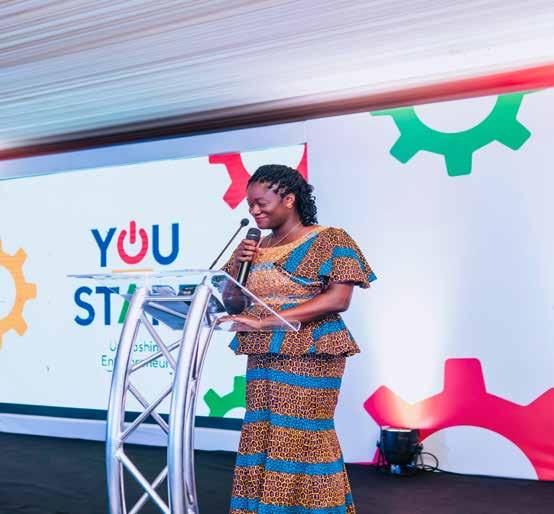
"The key challenge for Ghana is ensuring that there are su cient and better-quality jobs for the youth entering the labour market," he said, after expressing the hope that the YouStart initiative would contribute to address the chal lenge.
He urged the implementing part ners to be open to feedback during the implementation of the initia tive and remain exible to address concerns.
A portal for receiving applica tions from potential bene ciaries of the GH¢1 billion YouStart initia tive was opened yesterday for eligible applicants to register.
The opening of the portal, which also marked the o cial launch of one of the models under the state-assisted and private sector-funded entrepreneurship support, has paved the way for it to receive applications in the next six weeks, after which more than 50,000 applicants will be select ed for training.
The initiative was announced by the government in the 2022 budget, with the objective of building an entrepreneurial nation and creating at least one million jobs for the youth in three years — from 2022 to 2025.
Through the programme, the government and its partners intend to commit about GH¢10 billion over three years towards the creation of at least a million jobs.
tiful
He commended the World Bank for the grant to support the YouS tart programme, the implement ing agencies and all stakeholders.
would be eligible for Coaching and Mentoring support to assist them nalize business plans, conduct market research, formal ization support and test their products on the market.
It is being implemented by the Ghana Enterprises Agency (GEA) and the National Entrepreneur ship Innovation Programme (NEIP), with support from the World Bank.
future. The youth are our greatest assets".
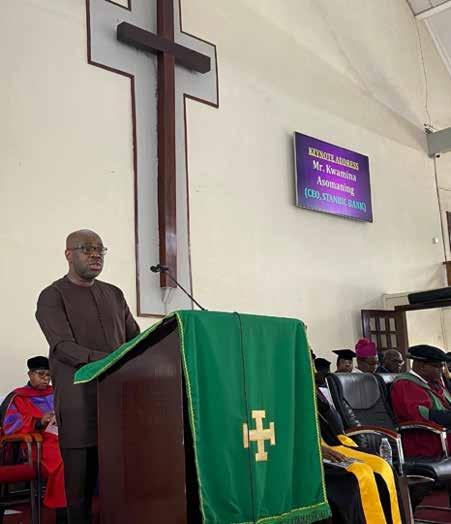
us do. We are seen as saying one thing on pulpits, lecterns or in churches and doing the exact opposite in other spheres of life. The church has the power of in uence to turn this around.”
a period of crisis at all levels. He said this in his Key Note Address at the 77th Graduation and 80th Anniversary of the Trinity Theo logical Seminary at Legon.

According to the Stanbic Bank
He said, “We are at the crossroads as a nation; a time when the body of Christ is facing leadership and credibility crises. This is a time that demands true leadership with character and integrity and each one of us here bears the responsibility of helping to correct this situation. It is very easy to nd people questioning the motives of individuals who identify as Christians - national
Kwamina Asomaning also noted that the percentage of Christians in the country must mean some thing more beyond just the num bers. According to him, “As Christians, we often rejoice when the statistics are read to us that Ghana is 70 percent Christian. But must our impact only be numerical? The very moment one refers to the fact that Ghana is a Christian majority nation, you are asked: “what is the quali ty of those Christians?” Given our Christian population of 70%, a failure of leadership in the church, inevitably means a failure of leadership in our soci ety. The people out there are counting on us to lead the drive towards social change. Let’s not disappoint them.”
Mr. Asomaning charged the grad uates to emulate the leadership qualities of Jesus Christ as they begin their leadership journey. He mentioned that “The need to show leadership and direction
our Lord Jesus Christ, and as graduands of a theological semi nary, you would agree with me that I am speaking the obvious when I reiterate that we have been called to emulate Christ; and His life presents us with the best template for leadership.”
Kwamina Asomaning also shared with the graduates four attributes that leaders have at their core. They were the attri butes of vision, which is expressed in the leader’s convictions, commitment and consistency, strategy, which is a viable plan to be executed, persistence, which requires a leader to have the tenacity to take bold steps and the attribute of empathy, which requires a leader to demonstrate care for his/her people.
The Trinity Theological Semi nary was founded in 1942 in Kumasi. It is the premier and leading ecumenical theological tertiary institution in Ghana and the West Africa sub-region. The Seminary o ers Christian theo logical education and training, teaching in biblical studies, mission and history, counsel ling, preaching and other prac tice-oriented ministry programmes in an enabling environment to resource pastors and Christian leaders for holistic ministry
Enterprise Group, the largest risk management and nancial services company in Ghana, has refurbished the Male Block of the Ankaful Psychiatric Hospital in the Central Region at an estimat ed cost of GHc 2 million.
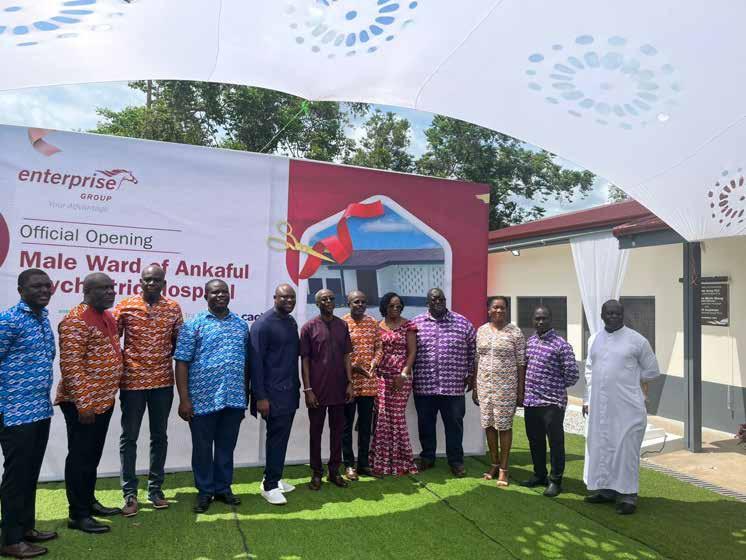
The refurbished male block comes with ve (5) wards, a conference room, a nurses’ station, pantry, dining hall, treat ment room, provision room and washrooms among others.
The refurbishment of the Male Block forms part of the Enter prise Group’s corporate social investments and its commitment to support the provision of sustainable healthcare to all.
Speaking at the handing over ceremony, CEO of Enterprise Group, Keli Gadzekpo said,
“At Enterprise Group we believe that being a good corporate citizen means that we have to be internally well governed and externally responsible. This is the reason why over the years, we have consistently involved ourselves in looking out for the vulnerable in society. In our small way we have tried to improve lives by creating a sustainable impact within the communities we operate, in the areas of Finan cial Literacy, Health and Philan thropy. We know the critical role Ankaful Psychiatric Hospital plays in the delivery of mental health care and we felt it a duty and an honor to respond to the hospital’s appeal for help.
He added that despite e orts by stakeholders to create awareness about mental health, more work
needed to be done to promote sensitization, ght the stigma and improve healthcare delivery for persons with mental health conditions.
Director of the Ankaful Psychiat ric Hospital, Dr. Kwadwo Obeng, thanked Enterprise Group for their support. He said the newly refurbished facility will go a long way to improve healthcare deliv ery at the center. He called on other corporate bodies and indi viduals to support them and contribute to the provision of sustainable healthcare in the country.

Over the past decade, Enterprise Group has established itself as a leader in the provision of risk management and nancial services to the Ghanaian popu-
lace. Since 2008, the brand has built the desired ADVANTAGE for millions of Ghanaians and has played an instrumental role in driving socio-economic development in Ghana. The Group has invested in various corporate social investment projects and sustainable social interventions across the coun try examples of which include the refurbishment of the children’s ward of Korle-bu Teaching Hospital, provision of dialysis machines and consum bles to the Police Hospital in Accra, provision of incubators to Keta hospital, construction of JSS block for Bishop Mixed JHS in Accra, cleft palate treatment under Operation Smile, polio eradication under Rotary Inter national and many others.
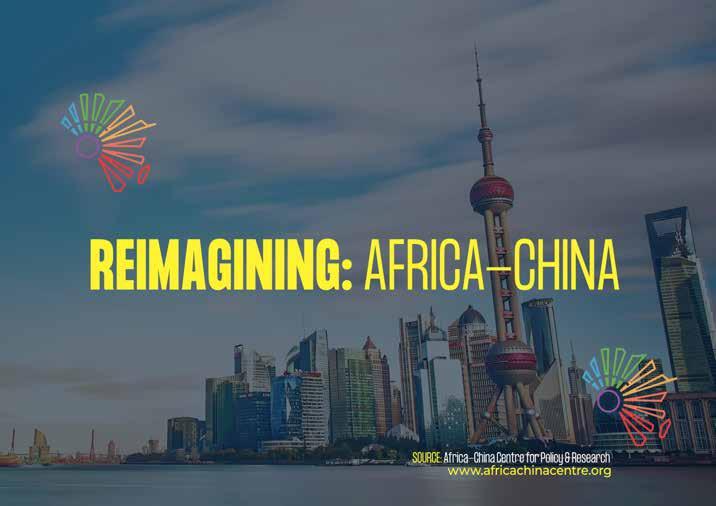
in Africa than the next eight largest lenders combined.
Signi cant infrastructural expen ditures are required for Africa to realize its full potential and boost trade among its member nations.
Building infrastructure in Africa is essential for promoting economic growth and raising the standard of living for Africans. It makes a substantial contribution to advancing humankind, reduc ing poverty, and achieving the Sustainable Development Goals (SDGs).
Over half of the recent increases in economic growth in Africa are attributable to infrastructure investment, and it has the poten tial to make an even greater contribution.
The primary infrastructure bottlenecks for the continent have long been identi ed as energy, water, sanitation, telecoms, and transportation. With 30 countries regularly facing power outages and with slightly more than a third of Africans having access to elec tricity, the continent's biggest infrastructure concern contin ues to be energy delivery.
Africa now needs to invest in its infrastructure at a rate of USD 130–170 billion year, with a
China has aggressively been at the centre of infrastructure nancing across the continent, helping African countries build a large number of infrastructure projects over the years.
In 2012, China rose to the top spot among foreign investors in Africa. Its infrastructure investments totalled $13 billion, with the World Bank coming in second place with roughly $4 billion.
China continues to lead the way According to research by the Center for Global Development, a US think tank, China's two major foreign development banks invested $23 billion in infrastruc ture projects on the continent between 2007 and 2020.
That amounts to $8 billion more than the combined contributions of the other top eight lenders, which include the World Bank, the African Development Bank, and the US and European devel opment banks.
The headline numbers speak for themselves. It demonstrates how aggressively Chinese investments have been made in Africa across a variety of sectors and how important it is to them to estab lish a relationship of equality and mutual bene t with African nations.
toes and asking questions as to whether the partnership between China and Africa has been positive.
Despite the expansion of trade between China and Africa, the continent remains one of China's smaller trading partners, accounting for only around 4% of China's overall trade. There is signi cant potential for the conti nent to signi cantly grow its exports to China while also reducing its trade de cit.
Many African nations are making e orts to close this de cit. For instance, Rwanda and Ethiopia are increasing their exports to China by attracting e-commerce customers there through innova tive marketing strategies. Kenya is also developing an online mar ketplace for the sale of agricul tural goods. China wants to import more products from Africa, particularly agricultural ones.
In order to reimagine trade and investment partnerships and to unlock the full potential of coop eration, African policymakers need to have a deliberate and concerted e ort across all economic sizes and industries.
It’s obvious that China will continue to remain an important trading partner for Africa over
relationship in order to stimu late economic growth and development, alleviate poverty, and reduce youth unemploy ment.
Countries must develop a com prehensive China policy, one that covers engagement tactics beyond merely securing natural resources.
Paul Frimpong, CGIA, ICCE Paul Frimpong is a develop ment economist, top voice on Sino-Africa relations, and an award-winning entrepreneur.
He’s currently the Executive Director & Senior Research Fellow at the Africa-China Centre for Policy & Advisory.
The Africa-China Centre for Policy and Advisory is a Sino-Af rican research and policy think tank and advisory rm head quartered in Accra, Ghana.
The Centre is dedicated to providing unbiased policy and market research as well as distinct views on Africa-China relations.
www.africachinacentre.org | py.frimpong90@gmail.com
On the afternoon of 14 November local time, President Xi Jinping had a meeting with U.S. President Joe Biden in Bali, Indonesia. The two presidents had a candid and in-depth exchange of views on issues of strategic importance in China-U.S. relations and on major global and regional issues.
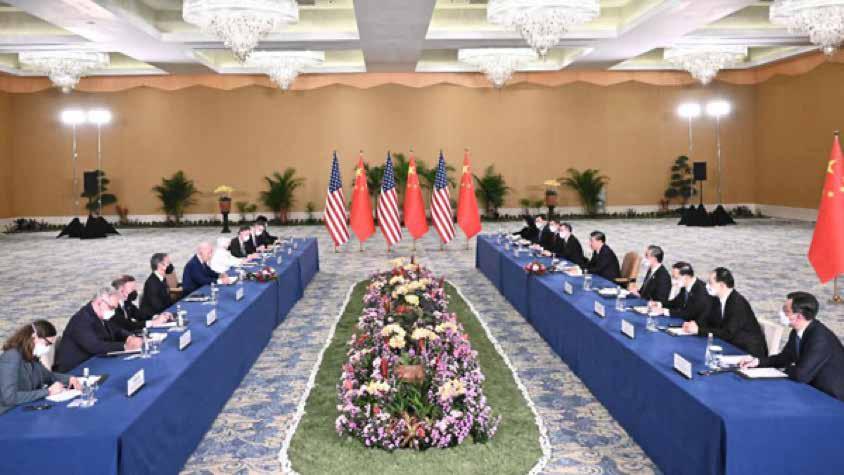
President Xi pointed out the current state of China-U.S. relations is not in the fundamental interests of the two countries and peoples, and is not what the international community expects. China and the United States need to have a sense of responsibility for history, for the world and for the people, explore the right way to get along with each other in the new era, put the relationship on the right course, and bring it back to the track of healthy and stable growth to the bene t of the two countries and the world as a whole.
President Xi expounded on the 20th National Congress of the Com munist Party of China (CPC) and its key outcomes. He pointed out that the domestic and foreign policies of the CPC and the Chinese govern ment are open and transparent, with clearly stated and transparent strategic intentions and great conti nuity and stability. We are advanc ing the rejuvenation of the Chinese nation on all fronts through a Chinese path to modernization, basing our e orts on the goal of meeting people’s aspirations for a better life, unswervingly pursuing reform and opening-up, and promoting the building of an open global economy. China remains rm in pursuing an independent foreign policy of peace, always decides its position and attitude based on the merits of issues, and advocates resolving disputes peace fully through dialogue and consul tation. China is committed to deep ening and expanding global part nerships, safeguarding the interna tional system with the United Nations at its core and the interna tional order underpinned by inter national law, and building a com munity with a shared future for mankind. China will stay commit ted to peaceful development, open development and win-win develop ment, participate in and contribute to global development, and pursue common development with coun tries across the world.
President Xi pointed out that the world is at a major in ection point in history. Countries need to both tackle unprecedented challenges and seize unprecedented opportu nities. This is the larger context in which we should view and handle
China-U.S. relations. China-U.S. relations should not be a zero-sum game where one side out-com petes or thrives at the expense of the other. The successes of China and the United States are opportu nities, not challenges, for each other. The world is big enough for the two countries to develop themselves and prosper together. The two sides should form a correct perception of each other’s domestic and foreign policies and strategic intentions. China-U.S. interactions should be de ned by dialogue and win-win coopera tion, not confrontation and zero-sum competition. President Xi said that he takes very seriously President Biden’s “ ve-noes” statement. China does not seek to change the existing international order or interfere in the internal a airs of the United States, and has no intention to challenge or displace the United States. The two sides should respect each other, coexist in peace, pursue win-win cooperation, and work together to ensure that China-U.S. relations move forward on the right course without losing direc tion or speed, still less having a collision. Observing the basic norms of international relations and the three Sino-U.S. joint com muniqués is vitally important for the two sides to manage di erenc es and disagreements and prevent confrontation and con ict; indeed, it is the most important guardrail and safety net for China-U.S. relations.
President Xi gave a full account of the origin of the Taiwan question and China’s principled position. He stressed that the Taiwan ques tion is at the very core of China’s core interests, the bedrock of the political foundation of China-U.S. relations, and the rst red line
that must not be crossed in China-U.S. relations. Resolving the Taiwan question is a matter for the Chinese and China’s inter nal a air. It is the common aspi ration of the Chinese people and nation to realize national reuni cation and safeguard territorial integrity. Anyone that seeks to split Taiwan from China will be violating the fundamental inter ests of the Chinese nation; the Chinese people will absolutely not let that happen! We hope to see, and are all along committed to, peace and stability across the Taiwan Strait, but cross-Strait peace and stability and “Taiwan independence” are as irreconcil able as water and re. We hope that the U.S. side will match its words with action and abide by the one-China policy and the three joint communiqués. Presi dent Biden has said on many occasions that the United States does not support “Taiwan inde pendence” and has no intention to use Taiwan as a tool to seek advantages in competition with China or to contain China. We hope that the U.S. side will act on this assurance to real e ect.
President Xi noted that freedom, democracy and human rights are the common pursuit of humanity and also the unwavering pursuit of the CPC. Just as the United States has American-style democ racy, China has Chinese-style democracy; both t their respec tive national conditions. The whole-process people’s democ racy practiced in China is based on the country’s reality, history and culture, and it re ects people’s will. We take great pride in it. No country has a perfect democratic system, and there is always a need for development
and improvement. The speci c di erences between the two sides can be worked out through discussion, but only on the precondition of equality. The so-called “democracy versus authoritarianism” narra tive is not the de ning feature of today’s world, still less does it represent the trend of the times.
President Xi pointed out that the two countries take di erent paths; while the United States practices capitalism, China practices socialism. Such di er ence is nothing new and will continue to exist. Leadership of the CPC and China’s socialist system have the support of 1.4 billion people. They are the fundamental guarantee for China’s development and stabil ity. For China and the United States to get along, it is vital to recognize and respect such di erence. Neither side should try to remold the other in one’s own image, or seek to change or even subvert the other’s system. Instead of talking in one way and acting in another, the United States needs to honor its commitments with concrete action.
President Xi underscored that China and the United States are two major countries with di er ent histories, cultures, social systems and development paths. There have been and will continue to be di erences between the two countries. Such di erences should not become an obstacle to growing China-U.S. relations. There is always competition in the world, but competition should be about learning from each other to become one’s better self and make progress togeth-
er, not about taking others down in a zero-sum game. The Chinese nation has the proud tradition of standing up for itself. Suppression and containment will only strengthen the will and boost the morale of the Chinese people. Starting a trade war or a technolo gy war, building walls and barri ers, and pushing for decoupling and severing supply chains run counter to the principles of market economy and undermine international trade rules. Such attempts serve no one’s interests. We oppose politicizing and weap onizing economic and trade ties as well as exchanges in science and technology. Under the current circumstances, China and the United States share more, not less, common interests. It is in our mutual and fundamental interest to prevent con ict and confronta tion and achieve peaceful coexis tence. The two economies are deeply integrated, and both face new tasks in development. It is in our mutual interest to bene t from each other’s development. It is also in our mutual interest to promote post-COVID global recovery, tackle climate change and resolve regional issues through China-U.S. coordination and cooperation. The two sides need to respect each other, pursue mutual bene t, focus on the larger picture, and nurture a sound atmosphere and stable relations for cooperation.
President Biden noted that he has known President Xi for many years and maintained regular
communication, but nothing could substitute for the kind of face-to-face meeting today. Presi dent Biden congratulated Presi dent Xi on his re-election as Gen eral Secretary of the CPC Central Committee. As two major coun tries, the United States and China have a responsibility to keep a constructive relationship. The U.S. side is committed to keeping the channels of communication open between the two presidents and at all levels of government, so as to allow candid conversations on issues where the two sides disagree, and to strengthen neces sary cooperation and play a key role in addressing climate change, food security and other important global challenges. This is vitally important to the two countries and peoples, and also very import ant to the whole world. President Biden rea rmed that a stable and prosperous China is good for the United States and the world. The United States respects China’s system, and does not seek to change it. The United States does not seek a new Cold War, does not seek to revitalize alliances against China, does not support “Taiwan independence”, does not support “two Chinas” or “one China, one Taiwan”, and has no intention to have a con ict with China. The U.S. side has no intention to seek “de-coupling” from China, to halt China’s economic development, or to contain China.
President Biden said that how the U.S-China relationship develops is of crucial importance to the future of the world. The United States
and China have a shared respon sibility to show the world that they can manage their di erenc es, and avoid and prevent misun derstandings and misperceptions or erce competition from veer ing into confrontation or con ict. The U.S. side shares the view that it is necessary to work out the principles guiding U.S.-China relations. The two teams may continue discussions on the basis of the common understandings already in place, and strive for early agreement. The U.S. government is committed to the one-China policy. It does not seek to use the Taiwan question as a tool to contain China, and hopes to see peace and stability across the Taiwan Strait.

The two presidents agreed that their respective diplomatic teams should maintain strategic com munication and conduct regular consultations; their nancial teams will continue dialogue and coordination on macroeconomic policies, economic ties and trade; and the two countries will jointly work for the success of the 27th Conference of the Parties to the United Nations Framework Con vention on Climate Change. The two sides reached common understandings on conducting dialogue and cooperation in public health, agriculture and food security. They agreed to make good use of the China-U.S. joint working group to promote the resolution of more issues. They also agreed that people-to-people exchange is very important, and agreed to
encourage the expansion of such exchange in all sectors.
The two presidents also exchanged views on the Ukraine crisis and other issues. President Xi pointed out that China is highly concerned about the current situation in Ukraine. He noted the four points about what must be done he had proposed soon after the outbreak of the crisis and the four things the international community must do together, he had suggested recently. Facing a global, com posite crisis like the one in Ukraine, it is important to give serious thought to the following: rst, con icts and wars produce no winner; second, there is no simple solution to a complex issue; and third, confrontation between major countries must be avoided. China has all along stood on the side of peace and will continue to encourage peace talks. We support and look forward to a resumption of peace talks between Russia and Ukraine. At the same time, we hope that the United States, NATO and the EU will conduct comprehensive dialogues with Russia.
Both presidents viewed the meeting as in-depth, candid and constructive. They instructed their teams to promptly follow up and implement the important common understandings reached between them, and take concrete actions to put China-U.S. relations back on the track of steady development. The two presidents agreed to maintain regular contact.
In the past few years, Dubai has become one of the most sought-after destinations for Gha naian travelers. It has something for everyone from nature lovers to culture vultures and even food ies. With so many unique experi ences to o er, you will nd your self coming back again and again. If you’ve never been to Dubai, this is your chance to experience it in all of its splendor, especially when the cooler weather hits.
Dubai is home away from home Dubai is always open to welcome citizens from all countries. In fact, the Emirate’s natives make up the minority of its population, while 80% are expats, including many Ghanaians. Interestingly, Dubai has a signi cant African population, who have been a part of its community for many years. As a result, some aspects of African culture have inevitably been woven into the vibrant tapestry of Dubai’s inclusive soci ety. There are African restau rants, hair salons, shops, and community centers. It really is a home away from home, with things to do and places to visit, for every budget.
Interested in visiting Dubai soon? Here are a number of things you can look forward to.

1.Museum of the Future: Located in the Financial District of Dubai, The Museum of the Future is a spectacular and innovative exhi bition space, which exhibits future environments. It stimu lates the senses and expands the minds of all those who visit the center. With a variety of virtual and augmented reality, big data analysis, arti cial intelligence and human machine interaction installations and displays, you are invited to go on a journey through possible futures and bring hope and knowledge back to the present.

2.Shopping & Cuisine: Dubai is home to the world’s largest desti nation for shopping, entertain ment and leisure – the Dubai Mall. With upwards of 1,200 stores,
this 1 million sqm establishment is in one word, bliss, for tourists, because of the plethora of activi ties housed within its walls. There are several other malls spread out all over the Emirate.
3.AURA Skypool: Visit the world’s rst and highest 360° in nity pool. Located on the 50th oor of the Palm Tower in the Palm Jumeirah, this elegant pool desti-
5.Global Village: The Global Village is a unique multi-cultural family destination created in 1997. The Park is a one-stop destination for some of the best entertainment, shopping, dining, and attractions in the region. One of Dubai’s top attrac tions, Global Village takes you on a cultural journey around the world.
views. Hatta Dome Park has 15 tents, each designed with chic minimalism in mind. Experi ence glamping like no other with tents tted with panoramic windows, a private outdoor terrace and many of the ameni ties you’d expect at a hotel.
Intrigued? Make a date to visit the Emirate with Emirates!
nation guarantees an “oasis-in-the-sky” feeling. Experi ence this unique and unforgetta ble o ering with friends and family, coupled with exquisite Asian cuisine from the menu.
4.Miracle Garden: Are you a lover of ora and fauna? The Dubai Miracle Garden is a must-visit for you. Take a drive out of the city and experience what you will likely describe as “paradise on Earth”. It is the world’s largest natural ower garden with more than 150 million owers in full bloom.
The serene, sweet-scented envi ronment is breathtaking. Enjoy the calmness of nature as you stroll through the garden of unique displays and oral designs like the oating lady, lake park, sun ower eld, smurfs village and hill top.
6.Palm Jumeirah: The Palm Jumeirah is one of the reasons you should ensure you have an aerial view of Dubai when you visit. It is the biggest manmade island, covering 15.3sqkm. It is directly accessible from the mainland via road and sea and within reach of many other tourist attractions. From above, the Palm Jumeirah resembles a stylized palm tree within a circle. There are hotels and apartments on the Palm where you can stay while visiting Dubai.
7.Glamping at Hatta Dome Park: If you are one of the outdoorsy folks with a hint of bourgeois, then visit the Hatta Dome Park for an unforgettable night under the stars, surround ed by epic mountainscape
Travel to Dubai with Emirates anytime from now until March 31, and you can access exclusive o ers at over 500 locations within the UAE, with the My Emirates Winter Pass. Emirates customers ying to or through Dubai can simply show their boarding pass and a valid form of identi cation to hundreds of retail, leisure and dining outlets, as well as famous attractions and luxury spas, to enjoy fantastic discounts throughout Dubai and the UAE.
For information on over 100 more things to do in Dubai, visit www.visitdubai.com. Connect with the local Emirates o ce via email (accres@emir ates.com) or simply check out www.emirates.com for ights and other relevant information, or contact your nearest Travel Agent.
 By Martin Ignacio Díaz Velásquez
By Martin Ignacio Díaz Velásquez
US President Richard Nixon launched the “war on drugs.” But, instead of improving public health and well-being in the United States by cracking down on drug use, he destroyed the lives of millions of people, both at home and abroad, especially in Latin America, Central Africa, and Southeast Asia. The question now is how to repair the damage. Nixon’s approach to drug use was fundamentally punitive. It thus puts great pressure on law enforcement and the penal system, while sending millions to prison for non-violent o enses. In 2020, US law enforcement recorded more than 1.1 million drug arrests, the majority for simple possession. Non-white people have been disproportion ately a ected, despite having similar rates of drug use and sales as white people. Globally, around one in ve people in prison are serving sentences principally tied to drug-related o ences. Moreover, the war on drugs has precluded e ective regulation of drug production and distribution. This makes it easier for minors to access prohibited substances, and generates exorbitant pro ts for the criminal organizations that terrorize local communities. The war on drugs is a boon for corrup tion and a disaster for the rule of law.
not prevented drug use: an estimated 271 million people worldwide use drugs that are prohibited under international treaties, while stigma and crimi nalization make users’ lives more perilous and unhealthy. Today, some 35 million people who use drugs need mental and physical health care, with seven million su ering from infectious diseases linked to intravenous drug use (HIV and viral hepatitis). More than 500,000 people die each year from overdose or adultera tion, and the rates of overdose deaths are on the rise.
Nowadays, the futility and destructiveness of the war on drugs is well established and widely acknowledged, with experts, public o cials, and civil-society organizations world wide revising their positions. A growing number of countries are moving to implement drug-policy reforms. In October, US President Joe Biden pardoned thousands of people who had been convicted on federal charges of marijuana possession since the war on drugs began.
While these steps are undoubtedly welcome, they are just the begin ning. Reforming international models for drug control and undo ing some of the damage of the war on drugs will require a humanitar ian approach, focused on non-pathologizing interventions
that advance individual and public health.
This includes mental health, which is closely linked to drug use. E orts to update and homogenize criteria for men tal-health assessment and stan dards of care are essential. Only then can inequalities in health-care access across regions be identi ed and addressed. More broadly, national drug policies should be aligned with international e orts.
International organizations, including the Red Cross and Red Crescent Societies, which have been working for decades to address the health consequences of drug abuse and the war on drugs, have long advocated such an approach. In 2005, the Italian Red Cross, the International Council on Security and Develop ment, and the Rome-based Fon dazione Villa Maraini came together to advance a framework for dialogue and cooperation on the development and implemen tation of humane and e ective drug policies. The set of princi ples this e ort produced – the Rome Consensus for a Humani tarian Drug Policy – was signed by 121 National Red Cross and Red Crescent Societies.
In 2020, the Red Cross and Red Crescent Societies – together with the C4 Recovery Foundation, the Levenson Foundation, the Police, Treatment, and Commu nity Collaborative, and the Know mad Institut – built on this achievement with the Rome Con sensus 2.0. The goal was to recruit new signatories from around the world and provide a blueprint for policy and best practices for the coming decade. As the Consensus points out, we have the tools, guidance, and evidence we need to “reduce and
unacceptable health and social harms associated with the world drug situation.” Prevention, treatment, harm reduction, and overdose management are all pieces of the puzzle.
The Rome Consensus 2.0 recog nizes that success can be achieved only if we “advocate at all levels to ensure more invest ments and public awareness to implement more humane and e ective drug policies.” Ending the stigma and discrimination faced by people who use drugs is thus vital to progress.
By fostering a more accurate, nuanced, and holistic under standing of drugs and drug use among the public – including, crucially, health-care profession als – education campaigns can go a long way toward advancing this goal. Such campaigns should acknowledge, for starters, the socio-cultural, historical, and even religious dimensions of drug use. The use of “sacred plants” (and substances that modify states of consciousness) has been documented for centu ries as a treatment for ailments and in spiritual practices.
Moreover, a growing body of research indicates that certain psychoactive substances have the potential to treat men tal-health disorders. Far from being synonymous with addic tion, some types of drug use can help to treat it. Casual and responsible drug use – which never turns into abuse – is often possible.
The war on drugs is a ght with no winners. The only way out is to embrace a new approach focused on saving lives, alleviat ing su ering, and maintaining human dignity. Nobody’s human rights, whether they use drugs or not, should be in doubt.
 By Raymond K. Baxey
By Raymond K. Baxey
tive crisis communication manage ment to repair the damage. That said, strategic thinking is crucial to the nuances of crisis communica tion and makes the di erence between e ective and ine ective crisis communication.
Therefore, to prevent hate speech, misinformation and disinforma tion, the government must ensure e ective crisis communication management.
Undeniably, the world economy is in a recession, and Ghana is not exempt. The question, how ever, is how e ective has government communication been in these turbulent times?
In a democracy, citizens must not only be aware of the govern ment's policies and activities, but must also participate, when provided with reliable, accurate, and timely information, particu larly in periods of growing economic challenges.
Are the boundary-spanning activities of the government's communication machinery pick ing up the right cues to inform the right communication strate gies? Ghanaians are dissatis ed, with some demonstrating rage at current events.
Scapegoating
Responding to concerns, some government o cials unfortu
denial response strategy that places the blame for the econom ic crisis on the COVID-19 pandem ic and the Russia-Ukraine war. Ghanaians are tired of it and think the response is lame. What should have been adopted earlier was the rebuilding and bolstering of response strategies to acknowledge responsibility, request forgiveness, and explain government’s e orts in mitigat ing the situation.
Additionally, reminding Ghana ians of the government's past good works and assuring them that we are all involved in making it better, while soliciting support. Regrettably, the growing economic hardship has threat ened the expectations of stake holders and the public, a ecting not only the nation's economy, but also the safety and moral fabric of the society.
Furthermore, it must ensure that the crisis communication is empir ically tested and theory based. For instance, assess how Ghanaians are responding to the economic crisis and the response strategies being used, and adopt a theory that guides and explains why certain actions are e ective and others are not.
It is, however, refreshing the Presi dent’s broadcast on Sunday, Octo ber 30, 2022, giving assurance that there was light at the end of the tunnel. It is also commendable that the Cabinet, the Economic Management Team (EMT), and the forex bureaus have met over the cedi depreciation.

Are these engagements enough? The government must broaden such consultations and also consider these crisis communica tion management recommenda tions:
as a great place to start to put an end to the situation; it must be more cooperative with stakehold ers and the public; it must speak with one voice and ensure consis tent crisis message; it must respond quickly to issues, partic ularly those that have the poten tial to further divide the nation and exacerbate the crisis; it must not attribute the nation's economic problems to the Russia-Ukraine war and the COVID-19 pandemic; it must deconstruct nancial jargons for the average Ghanaian to under stand them and also employ local languages in addition to English to disseminate information; it must embrace solutions o ered by experts, academics, and other key stakeholders. Outright rejec tion in crisis messages give an indication that you are not a listening government; it must be open and honest in crisis commu nication, and take post-crisis measures seriously.
All hope is not lost. The glass is half-full rather than half empty. Instead of focusing on the nega tive, let's consider the positive aspects of life and the things that bring us together.
The writer is a communications professional/member, Institute of Public Relations, Ghana/Ghana Journalists Association. E-mail: raymondbaxey@gmail.com
out a second thought. This is normally a small amount, say GHS 100, and if the item is below that, buy it. Then work out what your limit for tomorrow is; this is a higher amount, so you will need to think about the purchase a bit more. This could be between GHS 100 and GHS 300, and if the item is between those two amounts, think about it overnight. If you still want it the next day, buy it. Then the next week's limit is normally a larger amount, say about GHS 500. If the item is more than that, think about it for a week. If after a week you still want it, buy it. You will need to think about what limits will work for you; they could be lower or higher. But make sure that you have the money available and try to avoid using credit to fund impulsive purchases.
Use your loyalty and rewards programmes to your advantage. Look at where you will get the maximum bene t when using loyalty programmes. This is the best time to keep track on your cash back rewards for all the transactions you have made with your First National Bank VISA card or airtime you have purchased via the mobile App. This can be found in your savings pocket attached to your account on the App.


6) Investigate warranties and return policies
When buying technology or appliances, ensure you under stand the full terms and condi tions of the warranties. Also, if you are buying presents or cloth ing, check the return policy and if there are any time limitations.
7) Shop safely
As we start to get closer to the end of the year and the festive season looms near, we can feel the holidays are almost upon us. This end-of-year festive feeling, however, comes with several adverts encouraging us to spend money, and every day we see more and more adverts encour aging us to spend more. What is also happening is that the spending festive season
fall into the trap of overspending.

. The Head of Retail Banking at First National Bank shares a few tips to help you to nancially navigate Black Friday: 1) De ne your budget
Have a look at how much you can comfortably a ord this season without having to buy on credit. Be cautious - it will stand you in good stead later on. Once you have determined your budget,
3) Make a list and stick to it! We have heard this before but consider it sage advice nonethe less which requires a bit of disci pline. And as referenced in the point below, write the research prices down as well. When think ing about shopping during this time, think of the following points: what things do you need for the home, for example non-perishable groceries and stationery for kids next year. But remember to stay within your budget.
4) Do your research and shop around Do your research on how much the item normally costs. Then compare that to the discounts being advertised to ensure that the price is really discounted. This is a vital step in the process to make sure that the bargain that you are getting is actually a bargain. Look at the various retailers’ websites as well as brochures that are pub lished at this time and then com pare with the various retailers before you decide on where to make a purchase
5) Use loyalty or rewards programmes
Ensure that you are shopping safely and securely this time of year. Either shop online using card details on trusted platforms or swipe your card instead of using cash. When shopping online, make sure that you use your card or that the website that you enter your details into has HTTPS in the address bar and only use reputable websites for online shopping. Remember not to give anyone your PIN or your online banking details. Another great way to protect yourself is to make sure that you have your bank message or inContact activated, this will alert you immediately if there has been any unauthorised activity on your account.
“Black Friday is a great opportu nity to pick up a bargain and buy a few things that you have been looking at for a while. However, follow the tips above to make sure that you do not regret the money you have spent down the line”, concludes Akweley.
ENDS//
StorONE is radically revolutioniz ing expectations for performance, results, functionality, ease, and a ordability in data storage with a new type of software-de ned stor age (SDS).
In today's data-intensive environ ment, analytics are a major enter prise focus; in other words, the main challenge is guring out what to do with all the data you've gath ered. It's a crucial issue to resolve, but without a reliable foundation of e ective, long-term data stor age, you'll never succeed. After all, without a place to put the data, you can't examine it.
Accordingly, StorONE o ers solu tions to the current largest issues in data storage. These di culties include ransomware protection, high storage costs, data accessibili ty in the case of a disaster that disrupts operations, and data protection from any potential changes to stored data. Storage hardware is able to keep you ahead of these new challeng es, but the storage software is lack ing. Networking bandwidth has expanded from 10 Gigabit Ether net (GbE) to 200GbE, and input/output operations per second (IOPS) performance per drive has increased from 20K IOPS to over 800K IOPS in the last ten years, which has led to tremen dous breakthroughs in the storage business. Drive densities have increased from four terabytes (TB) to over 30TBs.
With the release of PCIe Gen 4, the trend has continued since 2021 and the maximum bandwidth will increase by more than 24GBs. More performance, capacity, and better data protection should be provided by a modern storage system while taking up less room and costing less money. But noth ing is taking place! Why? These days, the storage industry is being held back by storage software, which is like a ball and chain. StorONE, which has received more than 50 patents in its rst seven years of intense technical development, is fundamentally altering how storage is viewed by organizations, moving it away from being seen as an IT cost center and toward becoming a resource that gives them crucial competitive advantages.
As data storage paradigms change today and, in the future, StorONE's Storage Engine can help your busi ness cut storage expenses. The
highly e ective Storage Engine can increase the value and data resil ience of otherwise standard storage features including snapshots, drive failure protection, High-availability (HA) storage, data integrity, data security, and disaster recovery readiness.
By o ering an e cient storage engine that enables you to utilize the full capabilities (performance and capacity) of your storage hard ware, StorONE provides better stor age by considerably lowering stor age total cost of ownership (TCO) for any storage use case. The StorONE Engine o ers uncompro mised data safety while supporting all protocols and use cases, simpli fying the entire storage infrastruc ture.
Enterprise-class storage software from StorONE o ers complete func tionality, exceptional performance, and unrivaled data reliability. deliv ering unmatched data resilience features that shield users against ransomware, human error/mis takes, res, and oods; successfully stopping any data loss. The tech nology guarantees data storage e ciency by requiring less hard ware to complete the same work than its rivals.
“What we've done is to create a very e cient storage software program that takes full advantage of all the hardware innovation but doesn't force the customer to use any particular hardware. The term we use is “hardware abstraction”. So, you can use whatever hardware makes the most sense for you at that moment in time for that use case,” George A Crump – Chief Product Strategist, StorONE, said in an interview.
“Typically, customers will nd that the cost of our solution, even though it's more resilient and performs better, is somewhere between 50 to 60 percent less expensive than what they're currently buying.
“We just rewrote the way I/O works to be very, very e cient. We made sure its data has multiple layers of resiliency to protect against all di erent types of threats, including ransomware or malicious behav iors. Because we can deliver better performance and reliability with less hardware, we can signi cantly drive down the cost of storage,” Mr. Crump - Chief Product Strategist, StorONE mentioned.
The fundamental di erence here is that StorONE collapsed a whole
stack of complex layers that are in the usual storage software into a single layer. This ensures that the user’s application has almost direct access to the media, which guarantees about 80 percent of the manufacturer’s rated perfor mance of the drive and 90 percent of its available capacity. “So not only do we need fewer drives, but we can also use those drives to their full potential. And so, you get this cumulative e ect. That sign canlty drives down the cost of storage,” the Chief Prod uct Strategist, StorONE said. Other systems in the industry o er can only deliver about 10 to 15 percent of the performance of the drive’s hardware-rated performance, and they can only use about 50 percent of the capacity of those drives. For instance, if you bought twen ty- ve, 20TB drives, you’d only be able to use 250TB to 300TB of the potential 500TB of capacity before experiencing a signi cant drop in performance.
Jacques Blinbaum - Chief Execu tive - Africa, StorONE said, “the one thing we're seeing is that the hardware in many of the data centres in Africa are reaching their end of life. This presents a

major challenge. While there is a real need to process and protect data there are com peting chaalleges posed by the di culty in accessing the capital needed to build the needed facilities. So, what happens is everybody's recog nizing that the data has to be protected. Therefore, one has to maximize every Ghana Cedi is spent was spent to achieve the force maximum bene t.”
“The biggest challenge we have with that is getting the market to understand that this di erent approach is the best approach. And what we have to do is to really take baby steps with these new customers, so that they come on board with a small project commitment, and then once they feel comfortable with the commitment, then they embrace it fully and add on.”
StorONE is being used by many U.S. companies in the eld of nance, media, government, and education.
NASA, the U.S. space agency, uses StorONE to manage stor age of its images from their space telescopes.













November 16, 2022

Ministry of Employment and Labour Relations says it is nalis ing an improved document for passage into law by Parliament to intensify e orts to end all forms child labour in Ghana.
Known as the Harmonised Hazard ous Activity Framework, when passed into law, the comprehen sive policy will support existing frameworks to end all forms of child labour in all sectors of the economy.
The framework is being put together by the Ministry and its development partners, with support from the Trade for Decent Work Project – a global project aimed at improving the applica tion and compliance of conven tions to end the worst forms of child labour.
A report from the second Ghana National Plan of Action (NPA 2) on the elimination of the worst forms of child labour estimated that 21.8 per cent (1.9 million) children aged ve and 17, are engaged in child
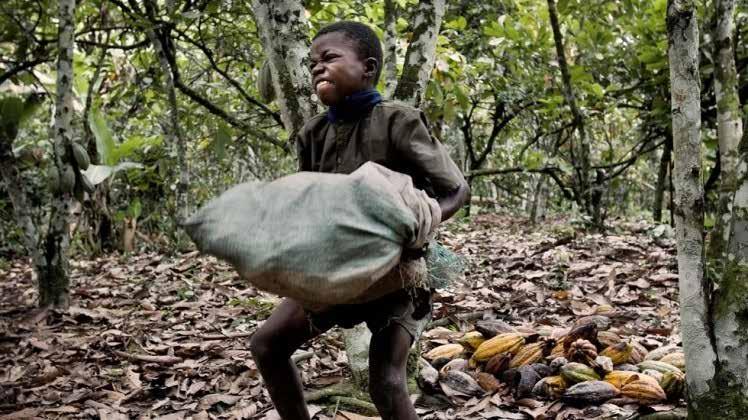
labour, with more than 1.2 million involved in hazardous work.
Mr Ignatius Ba our-Awuah, the sector minister, said the Govern ment remained committed to ending all forms of child labour across all sectors of the economy.
Speaking at the fourth National Child Labour Steering Committee meeting in Accra, he said the approach of the new framework was not to focus on child labour in the cocoa sector but ending it total ly in all spheres.
The Minister said the new legisla tion, when passed into law, would do away with all the misunder standings on what constituted child labour and give prominence to Ghana’s cultural heritage on the subject.
He said the Ministry would ensure that children under age 13 were taken out of any form of harmful work, well-educated and empow ered for the future.
He also said that the Ministry would ensure that children between 13
and 15 years did “guided work,” while those aged 15 to 18, worked under supervision to protect them from being exposed to any form of hazard.
“We will not relent on our e orts in making sure that we protect our children. We’re ready to work with our partners to get our children out of the street and hard labour so that they’ll dedi cate all their energies to study and grow to contribute their quota to national development,” Mr Ba our-Awuah said.
While encouraging international partnerships to end all forms of child labour in Ghana, Mr Ba our-Awuah said: “What we do not want, is the superimposi tion of foreign cultures on us and marking us with cultures of di erent countries.”
“It is for this reason that we’re developing the homegrown framework of activities, which takes into consideration our
cultural heritage,” the Minister added.
The Bureau of International Labour A airs of the United States of America reports that in 2021, Ghana made moderate advancement in e orts to end the worst forms of child labour. The e orts include the Govern ment developing a Public-Pri vate Partnership framework to address child labour in the cocoa industry.
It noted that the Government also drafted a new national plan of action to end human tra ck ing, with the Ministry of Gender, Children, and Social Protection developing a com munications strategy to guide outreach e orts on human tra cking issues for the years 2022–2026.
Source: GNA